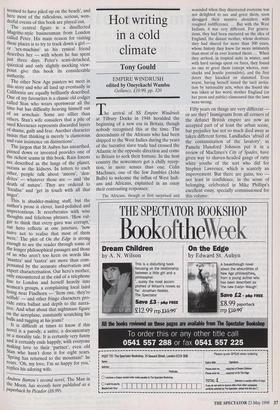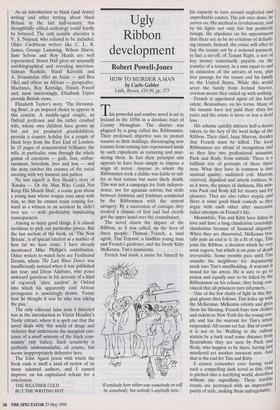Hot writing in a cold climate
Tony Gould
EMPIRE WINDRUSH edited by Oneyekachi Wambu Gollancz, £10.99, pp. 320 The arrival of SS Empire Windrush at Tilbury Docks in 1948 heralded the beginning of a new era in Britain, though nobody recognised this at the time. The descendants of the Africans who had been shipped to the West Indies during the years of the lucrative slave trade had crossed the Atlantic in the opposite direction and come to Britain to seek their fortune. In the host country the newcomers got a chilly recep- tion, in more senses than one. Colin Maclnnes, one of the few Jumbles (John Bulls) to welcome the influx of West Indi- ans and Africans, explained in an essay their contrasting responses:
The Africans, though at first surprised and wounded when they discovered everyone was not delighted to see and greet them, soon shrugged their massive shoulders with resigned indifference ... But with the West Indians, it was very different. For genera- tions, they had been nurtured on the idea of England, the distant mother, whose destinies they had shared for more than 300 years, whose history they knew far more intimately than most of us ever learned theirs ... When they arrived, in tropical suits in winter, and with hard savings spent on fares, they found no one to greet them (except whores, rent- sharks and hostile journalists), and the first doors they knocked on slammed. Even worse, having herself issued the tacit invita- tion by nationality acts, when she found she was taken at her word, mother England (or her press and public) clamoured that the laws were wrong.
Fifty years on things are very different or are they? Immigrants from all corners of the defunct British empire are now an accepted part of at least the urban scene, but prejudice has not so much died away as taken different forms. Landladies 'afraid of the contamination of the lavatory', as Pamela Hansford Johnson put it in a review of Maclnnes's City of Spades, have given way to shaven-headed gangs of ratty white youths of the sort who did for Stephen Lawrence, which is scarcely an improvement. But there are gains, too not least in confidence, in the sense of belonging, celebrated in Mike Phillips's excellent essay, specially commissioned for this volume. As an introduction to black (and Asian) writing and other writing about black Britain in the last half-century, this thoughtfully edited. anthology could hardly be bettered. The only notable absentee is V. S. Naipaul, who refused to be included. Older Caribbean writers like C. L. R. James, George Lamming, Wilson Harris, Sam Selvon and Roy Heath are well represented. Stuart Hall gives an unusually autobiographical and revealing interview. Salman Rushdie, Hanif Kureishi and A. Sivanandan offer an Asian — and Ben Okri and others an African — perspective. Maclnnes, Roy Kerridge, Enoch Powell and, most interestingly, Elizabeth Taylor provide British views.
Elizabeth Taylor's story, The Devastat- ing Boys', is an inspired choice to appear in this context. A middle-aged couple, an Oxford professor and his rather crushed wife, whose own children have grown up but not yet produced grandchildren, provide a country holiday for a couple of black boys from the East End of London. In 15 pages of concentrated brilliance the wife, in particular, runs through the whole gamut of emotions — guilt, fear, embar- rassment, boredom, love and loss — and the story catches the essence of the racial meeting with wry humour and pathos.
No less superb is Roy Heath's story of `Kwaltu — Or the Man Who Could Not Keep His Mouth Shut', a comic gem about a young man whose tongue runs away with him, so that he cannot resist coming for- ward as a witness to an accident he didn't ever see — with predictably humiliating consequences.
Among so many good things, it is almost invidious to pick out particular pieces. But the last section of the book, on 'The New Britain', is of special interest as a marker of how far we have come. I have already mentioned Mike Phillips's contribution. Other writers to watch here are Ferdinand Dennis, whose The Last Blues Dance was insufficiently noticed when it was published last year, and Diran Adebayo, who poses awkward questions in his account of a kind of rag-week 'slave auction' in Oxford into which his apparently cool African protagonist is unwittingly drawn: 'Funny how he thought it was he who was taking the piss.'
The only editorial false note I detected was in the introduction to Victor Headley's Yardie extract, where it is spelt out that the novel deals with 'the world of drugs and violence that underscore the marginal exis- tence of a small minority of the black com- munity' (my italics). Such sensitivity is perfectly understandable, of course, but seems inappropriately defensive here.
The John Agard poem with which the book ends is itself a kind of review of its many talented authors, and I cannot improve on his capitalised refrain for a conclusion: THE WEATHER COLD
BUT THE WRITING HOT.



































































 Previous page
Previous page